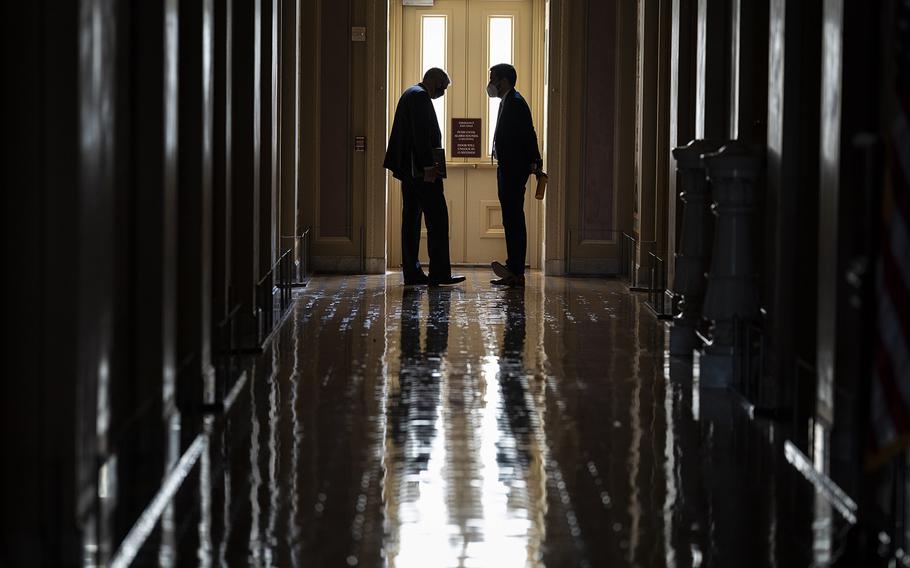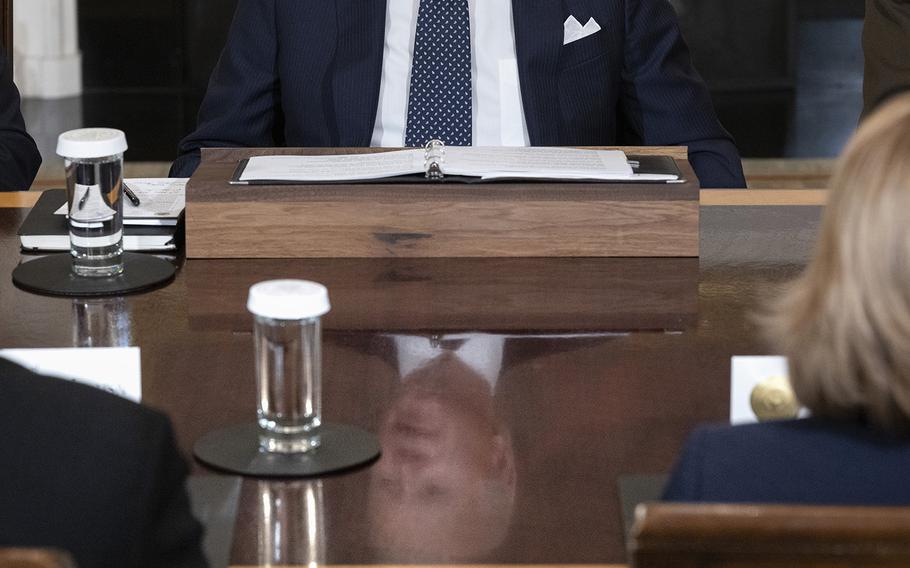Asia-Pacific
Trade takes a back seat to national security in Beijing and Washington
The Washington Post October 29, 2022

Sen. Jeff Merkley (D-Ore.) on Capitol Hill in July 2021. (Jabin Botsford/Washington Post )
WASHINGTON — National security fears in both Washington and Beijing threaten to eclipse prospects for greater commercial cooperation between the United States and China, leaving corporate executives worried about becoming casualties in a great power clash.
After four decades of knitting a profitable partnership, both countries are now emphasizing greater self-sufficiency. Supply chain snarls during the pandemic prompted some companies to back up their Chinese factories with plants in countries such as Vietnam while rising geopolitical tensions highlighted for both sides the risks involved in trading with a strategic adversary.
In Beijing this month, Chinese President Xi Jinping opened a landmark Communist Party Congress with a speech that stressed security and Marxist ideology. The Chinese leader broke with precedent by securing a third term as party general secretary and elevated hard line loyalists to top jobs in place of economic reformers.
The moves came two weeks after Biden effectively barred sales to China of the most advanced U.S. computer chips and chip-making technology. In the works for more than one year, the new export controls reflect the president's determination to constrain Beijing's development of sophisticated technologies that could be used to upgrade its military or surveil its own citizens.
The pivot from business-as-usual began more than four years ago under former president Donald Trump, who levied heavy import tariffs on goods from China and restricted Chinese technology companies from buying some critical U.S. components. But this month's Communist Party conclave and Biden's tough export limits marked a notable widening in the U.S.-China divide.
"It is a complete shift. We just have to realize that the old notion of putting a premium on the economy - these days are gone," said Joerg Wuttke, president of the European Union Chamber of Commerce in China, who has lived in China for the last 32 years. "The agenda is self reliance. We've entered a new era."
The new U.S.-China dynamic could be on display next month during a possible meeting between Biden and Xi at the Group of 20 summit in Bali, Indonesia. The two men, who have not met in person since Biden entered the White House, have much to discuss, including their $655 billion trade relationship and Taiwan, the self-governing island that Beijing claims as its own.
Investors have taken note of the tense new atmosphere. Following the party congress, Hong Kong's Hang Seng Index this week dropped more than 8 percent.
Meanwhile, in the United States, the chair and co-chair of the Congressional-Executive Commission on China on Thursday called for top executives from Wall Street banks including Goldman Sachs, Morgan Stanley, Citigroup and JPMorgan Chase to withdraw from planned appearances at an investment summit in Hong Kong next week.
Sen. Jeff Merkley (Ore.) and Rep. Jim McGovern (Mass.), both Democrats, said the U.S. executives should "reconsider" their decision to speak alongside Hong Kong Chief Executive John Lee, who was sanctioned by the United States two years ago for his role in the anti-democracy crackdown there, adding that they would otherwise be "complicit" in human rights abuses.
Citi chief executive Jane Fraser pulled out on Friday, citing a positive coronavirus test. Goldman Sachs, JPMorgan and Morgan Stanley declined to comment.
What may have seemed a temporary chill during the U.S.-China trade war has become a definitive break with the past. For decades, the United States and China prioritized economic links in their relationship, even as some warned that the two countries were destined to clash. But now, even though two-way trade volumes are running above last year's record pace, the balance has tilted definitively toward competition and contention.
"To a degree, everyone's been willing to set aside security concerns and other concerns in the pursuit of economic benefit that was good for both sides and the idea that it would lead to better relations," said Michael Schuman, senior fellow at the Atlantic Council in Beijing. "What's happening in both Beijing and Washington is there's now a willingness to sacrifice some of that economic gain for security reasons."
Xi's strongman approach is a drag on China's economy, which grew at an annual rate of 3 percent for the first nine months of this year, down from more than 8 percent last year. His signature "zero covid" policy has depressed consumer spending and industrial production with repeated lockdowns, including one this week that affected an Apple supplier in Zhengzhou.
Just 55 percent of American companies said they were optimistic about the five-year outlook in China, the lowest number ever, and down 23 percentage points from last year, according to a survey released Thursday by the American Chamber of Commerce in Shanghai. One-third of the companies responding said they had redirected planned China investments to other markets, almost twice the share that did in 2021.
Budweiser told investors this week that it is adjusting its spending in specific Chinese markets, depending upon covid caseloads. Caterpillar said its sales of 10-ton excavators are suffering from a slowdown in construction. And Boeing recently cut its forecast of China's expected aircraft needs over the next two decades.
"Trade volumes might say otherwise, but growing tensions in the political relationship have spilled over to a worsening commercial environment for many U.S. companies," said Myron Brilliant, executive vice president of the U.S. Chamber of Commerce. "It's more sand in the gears. It's going to get tougher."
Making relations worse, the export controls that the White House rolled out this month amount to the most forceful display yet of the administration's evolving strategy of high-tech containment. The Commerce Department regulations are intended to freeze China's chip-making abilities and thwart Beijing's efforts to build cutting-edge semiconductors to modernize its military.
The advanced chips and supercomputing capabilities that will be off limits can be used to build nuclear weapons, hypersonic missiles, autonomous systems and mass surveillance systems. Some of the same technologies will have lucrative commercial applications as well, analysts said.
On Thursday, Alan Estevez, undersecretary of Commerce for industry and security, said the administration had consulted with U.S. allies before announcing the move. The United States expects key trading partners to adopt similar measures soon, he said at the Center for a New American Security. He also suggested officials are considering additional tech-centered controls on quantum computing, biotechnology and artificial intelligence.
"We do not balance trade with national security," Estevez said. "When I see an action that needs to be taken for national security, I have top-down coverage to take care of that regardless of the impact."
But Estevez said the license requirements were not intended to hold back China's economic development. Chinese customers would retain "a robust capability to make semiconductors that are going to go into the air bags of cars, which I have no problem with," he said.
That probably understates the economic impact. In 2015, the Chinese government set a goal of producing 70 percent of the nation's semiconductors by 2025, up from 10 percent.
Halfway through the 10-year period, its domestic production had risen to just 16 percent, according to Andrew Collier, an economist with GlobalSource Partners in Hong Kong.

Reflected on a table, President Biden hosts a meeting with Defense Department leaders at the White House on Oct. 26, 2022. (Tom Brenner for The Washington Post )
"Biden's semiconductor sanctions will drive a stake into the heart of China's global ambitions. Xi Jinping has bet his reputation on creating a high-tech economy, but without western semiconductor equipment, he will have a tough time achieving this," said Collier, author of "China's Technology War."
The administration's insistence on a single-minded security rationale for the export controls has done little to ease business leaders' concerns. While companies that make toys and clothing in China probably have little reason for concern, other manufacturers worry the narrowly tailored technology curbs might expand.
Already, Google and Apple have shifted some production of their smartphones to Vietnam and India, respectively. Many companies, in other industries, are establishing alternative production sites outside China or drafting contingency plans to relocate operations.
"Look at consulting companies. Ten years ago, they were all about, 'How do I get into China?' " said Patrick Chovanec, an economic adviser for Silvercrest Asset Management in New York. "Now, it's all, 'How do I limit my China exposure?' "
While the Chinese government may not immediately retaliate for the U.S. export controls, analysts warn that the technology fight could develop a logic of its own. If the two countries continue to trade blows, other businesses worry they will be caught in the crossfire.
"The political and regulatory risk is definitely up," said Craig Allen, president of the U.S.-China Business Council. "If you're a company head or CEO, it's very difficult to calculate where this is going and what are your risks."
Still, China remains a lucrative market for flagship U.S. companies such as General Motors, Apple and Yum Brands, owner of Kentucky Fried Chicken. And some investors remain bullish.
"We see significant opportunities in China despite some investors' geopolitical concerns," Richard Bernstein, a New York investment manager, wrote in a client note this week.
Xi is expected, however, to whittle down commercial ties with the United States. The Biden administration's success this year in securing allied support for punishing financial sanctions on Russia, following its Feb. 24 invasion of Ukraine, left Beijing worried about being hit with similar measures in any future conflict over the status of Taiwan.
The once-every-five-years CCP Congress, which concluded Oct. 22, cemented Xi's vision of a threatening international climate. The congress projected a "very dark international environment with the United States at the core of that," one senior administration official said, speaking on the condition of anonymity to discuss the sensitive matter.
Xi stacked the seven-man Politburo Standing Committee with loyalists and elevated representatives of the hard line state security and public security ministries.
The party report uses the word "security" at least 80 times, including in references to "self-sufficiency around food and energy and all these things that could become an issue if there were to be a war around Taiwan," said David Shullman, a former U.S. intelligence officer now with the Atlantic Council.
Where Xi at the last party congress in 2017 said that "peace and development remain the call of our day," this year he warned the party faithful to prepare to withstand "high winds, choppy waters and even dangerous storms."
Diplomats from the two nations engage in far fewer meetings than in past years, leaving room for misinterpretation and misunderstanding. Isolation bred by strict covid quarantine protocols has eroded routines that brought together top American and Chinese officials numerous times each year.
"That also means that diplomacy is probably more important than ever," the official said. "And given Xi's uncontested powers, the only diplomacy that really matters now is the diplomacy with him."
The Washington Post's Jeanne Whalen contributed to this report.